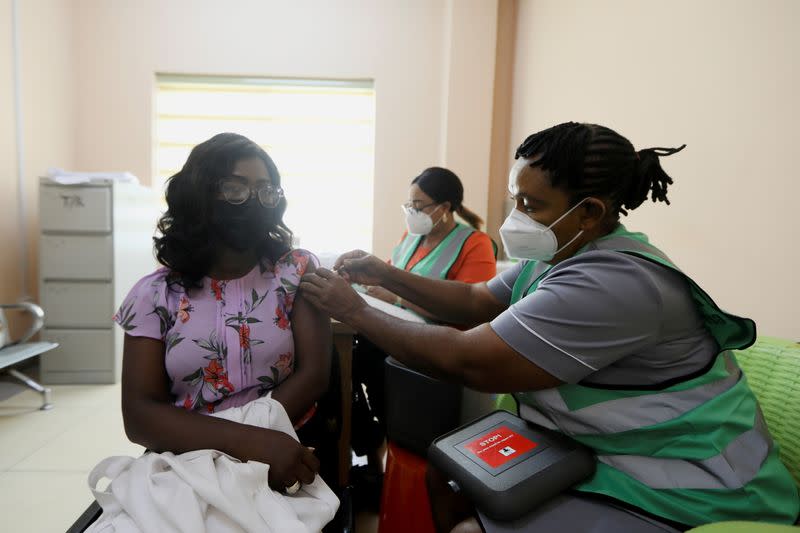What you need to know about the coronavirus right now
(Reuters) - Here's what you need to know about the coronavirus right now:
BioNTech, Pfizer vaccine neutralises Omicron with three shots
BioNTech and Pfizer said on Wednesday a three-shot course of their COVID-19 vaccine was able to neutralise the new Omicron variant in a laboratory test and they could deliver an Omicron-based vaccine in March 2022 if needed.
In the first official statement from vaccine manufacturers on the likely efficacy of their shot against Omicron, BioNTech and Pfizer said two vaccine doses resulted in significantly lower neutralising antibodies, but that a third dose of their vaccine increased the neutralising antibodies by a factor of 25.
Omicron reported in 57 countries, WHO says
The Omicron variant has been reported in 57 nations and the number of patients needing hospitalisation is likely to rise as it spreads, the World Health Organization said on Wednesday.
The WHO, in its weekly epidemiological report, said more data was needed to assess the severity of disease caused by the Omicron variant and whether its mutations might reduce protection from vaccine-derived immunity.
Germany records highest daily COVID deaths since February
Germany recorded the highest number of deaths from COVID-19 since February on Wednesday as it battled to stop a fourth wave of the pandemic.
A total of 69,601 new infections were reported, 2,415 more than the same time a week ago, and another 527 people died - the highest number since Feb. 12 - to bring the total to 104,047, the German Robert Koch Institute for disease control said.
South Korea considers expanded COVID-19 home care
South Korea will consider expanding home treatment of COVID-19 patients, a health official said on Wednesday, as both new daily infections and severe cases hit record highs, putting hospital capacity under strain.
Infections in South Korea have skyrocketed this month after the government began to ease restrictions under a so-called "living with COVID-19" scheme in November.
EU expects European plants to produce 3.6 billion shots in 2022
Vaccine plants in the European Union are expected to produce 3.6 billion COVID-19 shots next year, out of a global output of more than 20 billion, two senior EU officials said on Wednesday.
EU countries are administering boosters after having completed the primary vaccination of nearly 70% of the EU population, whereas in Africa only 7% have been immunised against the coronavirus, EU data show.
Minister says Nigeria had only weeks to use some donated vaccines
Nigeria's health minister said on Wednesday some COVID-19 doses donated by rich Western countries had a shelf life that left only weeks to administer the shots.
Two sources have told Reuters that up to one million COVID-19 vaccines are estimated to have expired in Nigeria last month without being used, one of the biggest single losses of doses that shows the difficulty African nations have in getting shots in arms.
Indian vaccine makers bank on boosters
Indian COVID-19 vaccine makers are lobbying the government to authorise boosters as supplies have so outstripped demand that one drugmaker told Reuters it had suspended a plan to produce more than 100 million doses of Russia's Sputnik shot.
The Serum Institute of India, the world's biggest vaccine maker, and Sputnik's Indian distributor, Dr. Reddy's Laboratories, have both said they have approached health authorities about boosters.
(Compiled by Linda Noakes; Editing by Jan Harvey)

 Yahoo Movies
Yahoo Movies 



